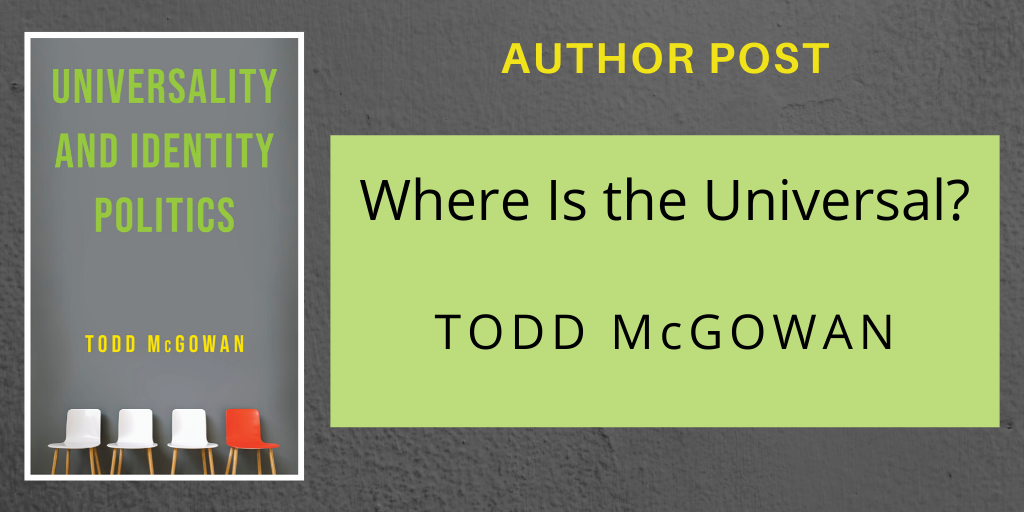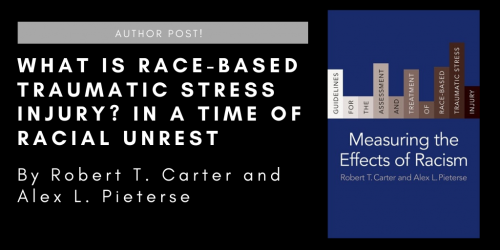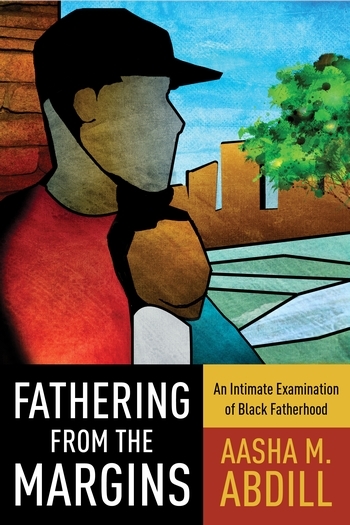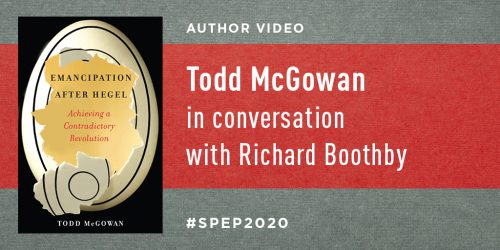Where Is the Universal?
By Todd McGowan

“Passionately yet patiently argued, Universality and Identity Politics looks back at earlier debates surrounding the universal and mounts fresh defenses of it. More than timely, this book writes to the moment.”
~Joan Copjec, author of Imagine There’s No Woman: Ethics and Sublimation
The past few months have been fraught with civil disobedience—first in response to the closing of business in response to the pandemic, and second in response to the murders of George Floyd, Breonna Taylor, and Ahmaud Arbery. In this post, Todd McGowan, professor of film studies at the University of Vermont and author of Universality and Identity Politics, contrasts the universality (or lack thereof), of the protests against coronavirus business closures and the protests supporting the Black Lives Matter movement.
Enter our book giveaway for a chance to win a copy of the book, and check back on Friday to read a book excerpt.
• • • • • •
The proximity between protests against state coronavirus closures and protests against racist policing prompts us to think about them in relation to each other. The protests that called for reopening American capitalism did so in the name of freedom, an ostensibly universal value. In contrast, the protests occasioned by the murder of George Floyd targeted a particular form of violence—specifically, police violence against Black Americans—without explicitly appealing to any universal values. But when we look at the two protest movements side by side, what quickly becomes apparent is that the universality does not belong to the movement that claims it.
One of the most striking aspects of the recent protests against racist police violence was the willingness of the protesters to encourage the police to take a knee alongside them. Despite the fact that the police were the target of the protests, they were not excluded from participating in them. While many officers responded with violence and only a few took a knee with the protesters, the fact that the protesters welcomed their antagonists into their ranks speaks volumes. Protesters could welcome the police officers into their movement because Black Lives Matter is a universalist movement. In its call for an end to racist policing, the movement did not target one particular injustice. By battling against police violence, Black Lives Matter advocated universal equality.
“In its call for an end to racist policing, the movement did not target one particular injustice. By battling against police violence, Black Lives Matter advocated universal equality.”
The focus on Black victims was not a particular focus but an indication of how we should look for the universal. The universal resides at the point of failure within the whole, the point where the social structure fails to become complete. By insisting on this point of failure—which is where we see racist police violence—we make the universal evident. We show that what unites everyone is not universal inclusion in the social structure but the inability of this structure to include all. We share a failure of belonging, not a successful belonging. Black Lives Matter reveals this by highlighting the point at which the structure has not included everyone.
The contrast with the protests seeking to open up the economy is stark. While these protesters brandished the universal value of freedom, the relationship that they had to the authorities gives the lie to this universal pretension. These armed militants confronted the police as their enemy rather than approaching them as potential allies (in the way that the Black Lives Matter protesters did). This is because their cause—a defense of unbridled capitalism, regardless of the cost in lives—was ultimately a particularist one. The capitalist economy reduces everyone to an isolated particular in competition with everyone else. When one becomes an advocate for capitalism, one necessarily reduces oneself and everyone else to the position of an isolated particular. There is no universal ground on which to stand within the capitalist approach, which is why the hostility between the protesters and the police was a necessary hostility. Their call for universal freedom was actually a call for the freedom of some to profit at the expense of the vulnerable.
“We do not find universality in blanket statements about freedom or equality.”
The most important political struggle lies in recognizing the universal. We do not find universality in blanket statements about freedom or equality. Nor does universality consist in adding up every particular individual in order to arrive at an all. This all will never be inclusive enough and will always leave someone out. Conceiving universality in this way means missing the possibility of real universality. We can only discover the universal through the point at which the social structure fails to complete itself, through taking up the cause of those left out. The connection that we have with each other derives from a collective failure, not a successful achievement of totality.
The political bearing of every movement requires interpretation. When we look at the popular embrace of Black Lives Matter and the widespread dismissal of the protests against coronavirus closures, we can see how universality lurks beneath the apparent particularity of Black Lives Matter and how particularity drives the self-proclaimed universality of the reopening movement. Universal movements have targets that they attack—such as racist policing and police violence—but they do not have enemies. This contrasts them with particularist movements. The champions of the particular bring guns to the rallies because they have enemies that they fear and that they would like to destroy. The Black Lives Matter protesters do not have guns because they are figures of universality. They protest looking to transform their opponents into their comrades. They are not searching for enemies to destroy. When we examine the difference between universality and particularity, we must always pay attention to who has an enemy.








